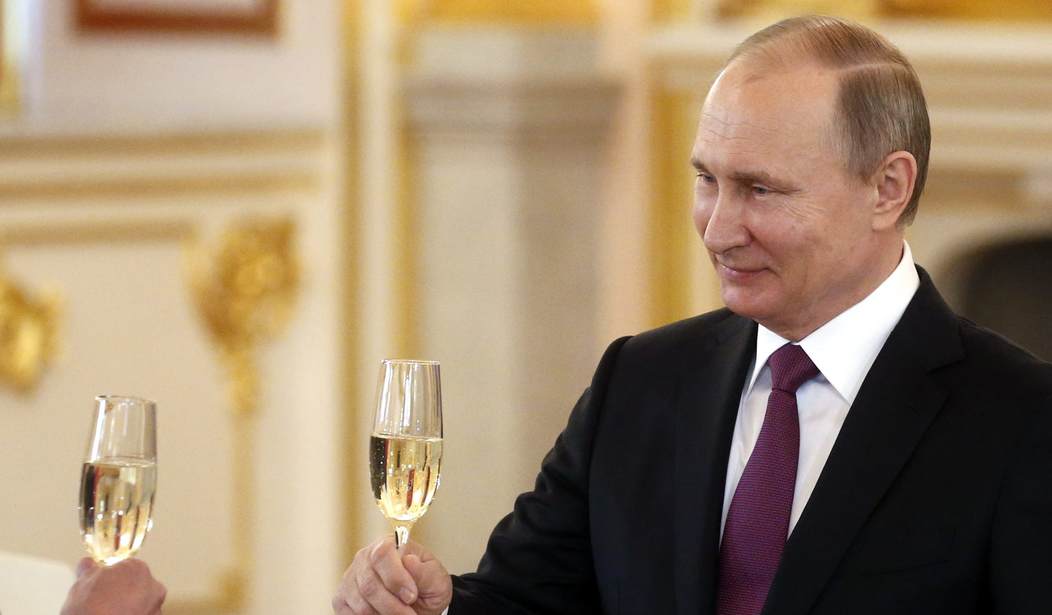In the midst of the quondam Russia Investigation that seems to have been going on since the Peloponnesian War, our president tweeted out the following.
When will all the haters and fools out there realize that having a good relationship with Russia is a good thing, not a bad thing. There always playing politics – bad for our country. I want to solve North Korea, Syria, Ukraine, terrorism, and Russia can greatly help!
— Donald J. Trump (@realDonaldTrump) November 12, 2017
Shortly thereafter, Andrew McCarthy, a man I respect immensely and who only the day before had posted a brilliant article virtually eviscerating the aforementioned investigation, tweeted thusly:
This is so galactically stupid it’s impossible to quantify. I’m happy to be a hater and fool, and await the 8-dimensional chess explanation for why idiocy is the new brilliant. https://t.co/xmoLsSBv8G
— Andy McCarthy (@AndrewCMcCarthy) November 12, 2017
Though Andy may have employed the word “galactically” to accrue Twitter attention — something of which we are all frequently guilty — I think he is in error anyway. Leaving aside the Trumpian bravura and clumsy language, the president’s basic approach is correct.
It was also the approach employed by George W. Bush, Hillary Clinton, John Kerry, and Barack Obama before him, all of whom, it is well known, sought outreach to Putin (pathetically in Obama’s case) and largely failed. Before the politically charged current investigation, which impelled the Democratic Party and most of the media to have the ideological equivalent of an impromptu sex change operation re: Russia, Trump was apparently going to make an attempt of his own.
Would he have succeeded? Hard to say, though Donald’s mercurial negotiating style is arguably more effective than his predecessors’ utterly conventional one. As an example, when the president said the U.S. had been paying too much for NATO and questioned whether the organization had outlived its usefulness, our partners suddenly coughed up.
Notably, another American president made an outreach to Russia, then the Soviet Union, and did succeed. As we all know, his name was Ronald Reagan and his catch phrase in dealing with the Russians was “trust but verify.” It got a lot accomplished, including, at least in part, the demise of the Soviet Union.
Now it was a different time, obviously, and Reagan was dealing with Mikhail Gorbachev, a different personality from Vladimir Putin, but the strategy remains. It’s not so distant, really, from “keep your friends close and your enemies closer” — a tactic some attribute to Sun Tzu and Machiavelli and more recently to Michael Corleone. (The two phrases are, in essence, corollaries. Keep you enemies close to verify them.)
I would wager that Trump — who immediately sent in the missiles when Assad acted out — is more equipped to deal with Putin than any of the previous presidents, other than Reagan. Obama clearly floundered disastrously, making a hash of Syria (and Libya) and helping to cement the alliance between Russia and Iran.
An opportunity might exist for Trump to weaken that Russia-Iran nexus, which would benefit the world, but the Russia investigation impedes that. Looked at in macro, that investigation seems less like a serious look at Russian intervention in our elections, which isn’t all that great in any case, but rather a blood-letting among American elites, ironically rather like typical internal Politburo behavior. Who will be left sitting on the dais after the purge? Who will come out the worse — Manafort or the Podestas? Trump or Hillary?
Granted that Russia loves to play us. They always have, to greater or lesser degrees. Diana West’s American Betrayal details a level of Soviet infiltration during the FDR-Alger Hiss era that is staggering. Whether exaggerated or not, it’s a reminder of who our enemies are.
But Mueller’s Russia investigation seems aimed not so much at unearthing anything about Russia — the FBI apparently didn’t seriously investigate even the most obvious questions like who actually hacked the DNC server — as it is at facilitating this blood-letting and preserving the FBI as an institution. It is a Deep State enterprise and, as with so many Deep State activities, the lives of regular American citizens are irrelevant. In this case we could also say world citizens.
It’s to the credit of Donald Trump that, though assaulted for non-existent Russian ties from the beginning of his presidency and even before (as is now emerging from the despicable tale of the Fusion GPS dossier), he has continued to examine possible areas of agreement with Russia for the good of our country and everyone else as well. As the man said — “Trust but verify!”
ADDENDUM: I would never consider myself a “Russia expert” (whatever that means) but I have visited the country four times, twice for extended periods during Soviet times. I was friends for many years until he died with their most famous thriller writer, himself allegedly a colonel in the KGB. So I have some sense of how they think and it has always stuck me as completely ludicrous that they would meddle in our election in order to get Trump elected. They are not idiots and would have seen that as a hopeless task since some 98% of our pundits and virtually all the polls saw Clinton as the winner. Of course, they engaged in data/email theft and disinformation activities. Spying is as Russian as borscht. But like everyone else, they expected Hillary to win. You can take whatever implications from that that you wish. And, yes, I still believe Julian Assange about the emails until proven otherwise.
Roger L. Simon is an award-winning novelist, Academy Award-nominated screenwriter and co-founder of PJ Media. His latest book is I Know Best: How Moral Narcissism Is Destroying Our Republic, If It Hasn’t Already. Apropos Russia, Mr. Simon, with Sheryl Longin, has written a play The Party Line.









Join the conversation as a VIP Member